Medley is a combination of four different swimming styles—backstroke, breaststroke, butterfly, and freestyle—into one race. This race is either swum by one swimmer as individual medley (IM) or by four swimmers as a medley relay.

Swimming has been a sport at every modern Summer Olympics. It has been open to women since 1912. Swimming has the second-highest number of Olympic medal contested events after athletics.

The men's 100 metre freestyle event at the 1976 Summer Olympics took place between July 24 and 25. This was the first time in history that the 100m freestyle was swum under 50 seconds. There were 41 competitors from 27 nations. Nations had been limited to three swimmers each since the 1924 Games. The event was won by Jim Montgomery of the United States, the nation's second consecutive and tenth overall victory in the men's 100 metre freestyle. His countryman Jack Babashoff took silver. Peter Nocke's bronze was the first medal for West Germany in the event, though the United Team of Germany had won a bronze in 1964.

The men's 100 metre freestyle event at the 1980 Summer Olympics was held on 26 and 27 July at the Swimming Pool at the Olimpiysky Sports Complex. There were 39 competitors from 26 nations. Nations had been limited to three swimmers each since the 1924 Games. The event was won by Jörg Woithe of East Germany, the nation's first medal in the men's 100 metre freestyle. Sweden earned its first medals in the event since 1952 with Per Holmertz's silver and Per Johansson's bronze.
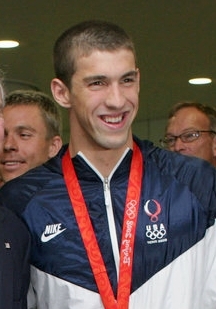
The men's 200 metre freestyle event at the 2008 Olympic Games took place on 10–12 August at the Beijing National Aquatics Center in Beijing, China. There were 58 competitors from 50 nations.
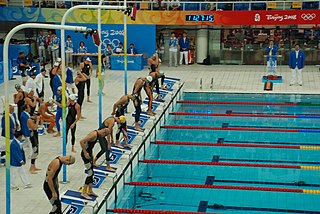
Swimming is an individual or team racing sport that requires the use of one's entire body to move through water. The sport takes place in pools or open water. Competitive swimming is one of the most popular Olympic sports, with varied distance events in butterfly, backstroke, breaststroke, freestyle, and individual medley. In addition to these individual events, four swimmers can take part in either a freestyle or medley relay. A medley relay consists of four swimmers who will each swim a different stroke, ordered as backstroke, breaststroke, butterfly and freestyle.

Freestyle is a category of swimming competition, defined by the rules of the International Swimming Federation (FINA), in which competitors are subject to a few limited restrictions on their swimming stroke. Freestyle races are the most common of all swimming competitions, with distances beginning with 50 meters and reaching 1500 meters, also known as the mile. The term 'freestyle stroke' is sometimes used as a synonym for 'front crawl', as front crawl is the fastest surface swimming stroke. It is now the most common stroke used in freestyle competitions.
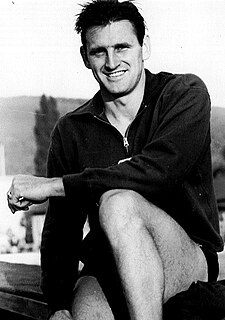
The men's 100 metre freestyle event at the 1948 Olympic Games took place between 30 and 31 July at the Empire Pool. There were 41 competitors from 19 nations. Nations had been limited to three swimmers each since the 1924 Games. The event was won by Wally Ris, returning the United States to the podium in the event after a one-Games absence broke a seven-Games streak. It was the sixth victory for an American in the 100 metre freestyle, most of any nation. Another American, Alan Ford, took silver. Géza Kádas of Hungary earned bronze, the nation's third medal in four Games. Japan's three-Games medal streak in the event ended with no Japanese swimmers competing due to the nation not being invited after World War II.

The men's 100 metre freestyle event at the 1952 Summer Olympics took place between 26 and 27 July at the Helsinki Swimming Stadium. There were 61 competitors from 33 nations. Nations had been limited to three swimmers each since the 1924 Games. The event was won by Clarke Scholes of the United States, the nation's second consecutive and seventh overall victory in the men's 100 metre freestyle. Japan, absent from the 1948 Games after World War II, returned to the podium in the event with Hiroshi Suzuki's silver. Göran Larsson earned Sweden's first medal in the event since 1908 with his bronze.

The men's 100 metre freestyle event at the 1956 Olympic Games took place between 29 and 30 November. There were 34 competitors from 19 nations. Nations had been limited to three swimmers each since the 1924 Games. The event was won by Jon Henricks of Australia, the nation's first medal in the event. Australia would win a second 0.4 seconds later and a third 0.9 seconds after that, sweeping the podium—the first sweep in the men's 100 metre freestyle since the United States did it in 1920 and 1924, and the first sweep of any event by Australian competitors. This year, the Americans finished fourth through sixth. It was the first time since 1924 that Japan had competed but not medaled.
The men's 400 metre freestyle event at the 1956 Olympic Games took place between 1 and 4 December. This swimming event used freestyle swimming, which means that the method of the stroke is not regulated. Nearly all swimmers use the front crawl or a variant of that stroke. Because an Olympic-size swimming pool is 50 metres long, this race consisted of eight lengths of the pool.
The women's 400 metre freestyle event at the 1956 Olympic Games took place between 5 and 7 December. This swimming event used freestyle swimming, which means that the method of the stroke is not regulated. Nearly all swimmers use the front crawl or a variant of that stroke. Because an Olympic size swimming pool is 50 metres long, this race consisted of eight lengths of the pool.

The men's 100 metre freestyle event at the 1960 Olympic Games took place between August 26 and 27. There were 51 competitors from 34 nations. Nations were limited to two swimmers each, down from three in previous Games. The event was won by John Devitt of Australia over Lance Larson of the United States in a controversial, disputed finish that resulted in a push for electronic timing. It was Australia's second consecutive victory in the event, third-most all-time behind the United States' 7 gold medals and Hungary's 3. Devitt, silver medalist four years earlier, was the fifth man to win multiple medals in the event. Manuel dos Santos earned Brazil's first medal in the men's 100 metre freestyle with his bronze.
The women's 100 metre freestyle event at the 1960 Olympic Games took place between August 26 and 29. This swimming event used freestyle swimming, which means that the method of the stroke is not regulated. Nearly all swimmers use the front crawl or a variant of that stroke. Because an Olympic-size swimming pool is 50 metres long, this race consisted of two lengths of the pool.

The men's 100 metre freestyle event at the 1964 Olympic Games took place between October 11 and 12. There were 66 competitors from 33 nations. Nations were again able to bring up to three swimmers each after a one-Games limit of two in 1960. The event was won by Don Schollander of the United States, the nation's first victory in the event since 1952 and eighth overall. Great Britain and the United Team of Germany both earned their first medal in the men's 100 metre freestyle.
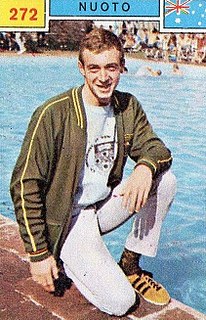
The men's 100 metre freestyle event at the 1968 Olympic Games took place between 18 and 19 October. There were 64 competitors from 34 nations. Nations had been limited to three swimmers each since the 1924 Games. The event was won by Michael Wenden of Australia, the nation's third victory in four Games. Americans Ken Walsh and Mark Spitz took silver and bronze, respectively.

The men's 200 metre freestyle event at the 1968 Olympic Games took place on 24 October at the Alberca Olímpica Francisco Márquez. It was the third time the event was held, returning for the first time since 1904. There were 57 competitors from 26 nations, with each nation having up to three swimmers. The event was won by Michael Wenden of Australia, the nation's second victory in the event ; Australia extended its podium streak in the event to three Games over 68 years. It was Wenden's second gold medal of the Games, completing a 100/200 free double. Americans Don Schollander and John Nelson took silver and bronze, respectively.

The men's 100 metre freestyle event at the 1972 Olympic Games took place between September 2 and 3. There were 48 competitors from 29 nations. Nations had been limited to three swimmers each since the 1924 Games. The event was won by Mark Spitz of the United States, his then-record sixth gold medal in a single Games. It was the ninth victory in the event for an American, most of any nation. Jerry Heidenreich, also of the United States, took silver. Soviet swimmer Vladimir Bure earned bronze, the nation's first medal in the men's 100 metre freestyle.
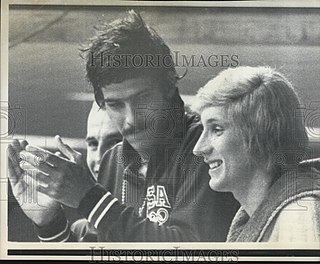
The men's 200 metre freestyle event at the 1972 Summer Olympics took place on August 29 at the Olympia Schwimmhalle. There were 46 competitors from 27 nations, with each nation having up to three swimmers. The event was won by Mark Spitz of the United States, the nation's second victory in the event. It was the third gold medal for Spitz in 1972, halfway to his goal of six. His teammate Steve Genter took silver, with Werner Lampe of West Germany earning bronze. Defending champion Michael Wenden of Australia finished fourth.
The women's 100 metre freestyle event at the 1972 Olympic Games took place between August 28 and 29. This swimming event used freestyle swimming, which means that the method of the stroke is not regulated. Nearly all swimmers use the front crawl or a variant of that stroke. Because an Olympic size swimming pool is 50 metres long, this race consisted of two lengths of the pool.














